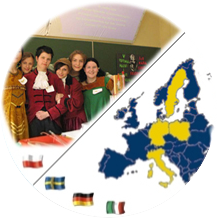Sylwester

31st December and 1st January – the night on 31st December is colloquially called Sylwester in Poland and the beginning of the new year is celebrated by opening of a bottle of shampagne right at midnight. People meet either at homes or at parties in clubs, restaurants or even castles. Soon after new year toasts people go outside to admire firework displays.
Day of Three Wise Men

6 January – Day of Three Wise Men called in Polish Trzech Króli (literarly Day of Three Kings) – a religious celebration with church services. People write the letters K+M+B and the year on the door to their houses. The letters stand for the first letters of Kings’ names: Kacper, Melchior and Baltazar
Grandmother's and Grandfather’s Day

21 January – Grandmother’s Day and 22 January – Grandfather’s Day – on both days children think of and thank their grandparents fro bringing up, usually give them some presents and in kindergartens or primary schools children prepare shows for their grandparents.
St Valentine's Day

14 February - there is actually no tradition to celebrate that day in Poland although it is getting more and more popular. You can see shop decorations and people buying flowers or sweets for those they love.
Women Day

8 March – Women Day celebrated to show respect to women and their rights. It commemorates the women’s fight for equal rights. Usually women are given some flowers on that day. There are also some manifestations or parades and demonstrations organised by women and for them.
Prima Aprilis
1 April – All Fools Day known as Prima Aprilis in Poland - it’s a day when everybody plays jokes or pranks. There are also some fake or funny facts and pieces of information presented in the TV and radio news or published in the newspapers.
Easter

Easter - also an important religious holiday. The preparations begin earlier. The period of Lent starts on Ash Wednesday and on that day all the churches hold services at which ash is sprinkled on the worshippers' heads. During Lent many Catholics give up some of their pleasures, for example eating sweets or drinking alcohol. Another significant day is Good Friday when people go to church to pray at the symbolic tomb of Christ. Holy Saturday is the time for preparing food and painting Easter eggs which are later taken to church in special baskets for consecration. Other products include meat, bread, salt and the Easter Lamb made of sugar or butter. The most important day of Easter is Sunday when lots of people participate in church services.
The Labour Day

1 May – the Labour Day – international holiday celebrated all over the world as the day of workers and working class. It used to be one of the most important national holidays. However, there are still some parades and demonstrations in many towns.
The Constitution of Poland Day

3 May – an important national day commemorating signing the Constitution of Poland in 1791 (the first constitution in Europe, the second in the world – after the USA constitution). After 1946 it was regarded as unofficial by the government and therefore, it was illegal to celebrate it. Since 1990 one of the most important national holidays in Poland.
National Education Day

14 October – National Education Day also known as Teacher’s Day – it’s a holiday for all people working in schools, a day-off for students of all types of schools
All Saints’ Day

1 November – All Saints’ Day – It’s a religious holiday, the day of remembrance about all those who died. On that day people visit the cemeteries where they put flowers and light candles on the graves. Very solemn and quiet day when people pray for the dead.
Independence Day

11 November - official national celebration commemorating regaining independence in 1918. On that day there are official parades or marches. The most important one takes place in Warsaw and is attended by the President and the government representatives. They lay down wreaths at the symbolic grave of an Unknown Soldier to pay tribute to all those who fought for the country and its freedom. There is also a parade of all military forces.
Andrzejki

Andrew's Night - celebrated on 30th November. It's not an official holiday so people don't have a day-off at work or school but they meet in the evenings for parties and foretelling the future. It's especially popular with unmarried girls who try to figure out who their future husbands can be. The most popular custom is pouring hot melted wax through a key hole into cold water and then looking at its shape and analyzing what it could mean.
Christmas

One of the most important holidays. It's similar to the worldwide celebrations as people in Poland also decorate Christmas trees, prepare lots of tasty traditional dishes, exchange presents and sing carols. The difference though is that main celebrations fall on the 24th December - Christmas Eve - when the whole families gather at traditional dinner. The celebration begins with the sharing the holy wafer by the family members while offering everyone good wishes. The dinner traditionally consists of twelve dishes like red borsch, fried carp, cabbage with mushrooms and a poppy-seed cake. What is important, no meat is eaten on that day. There is also a custom of leaving an empty plate for an unexpected guest and putting some hay under the tablecloth. At midnight people attend a special church service. On Christmas and Boxing Day people usually stay at home or visit their relatives.



